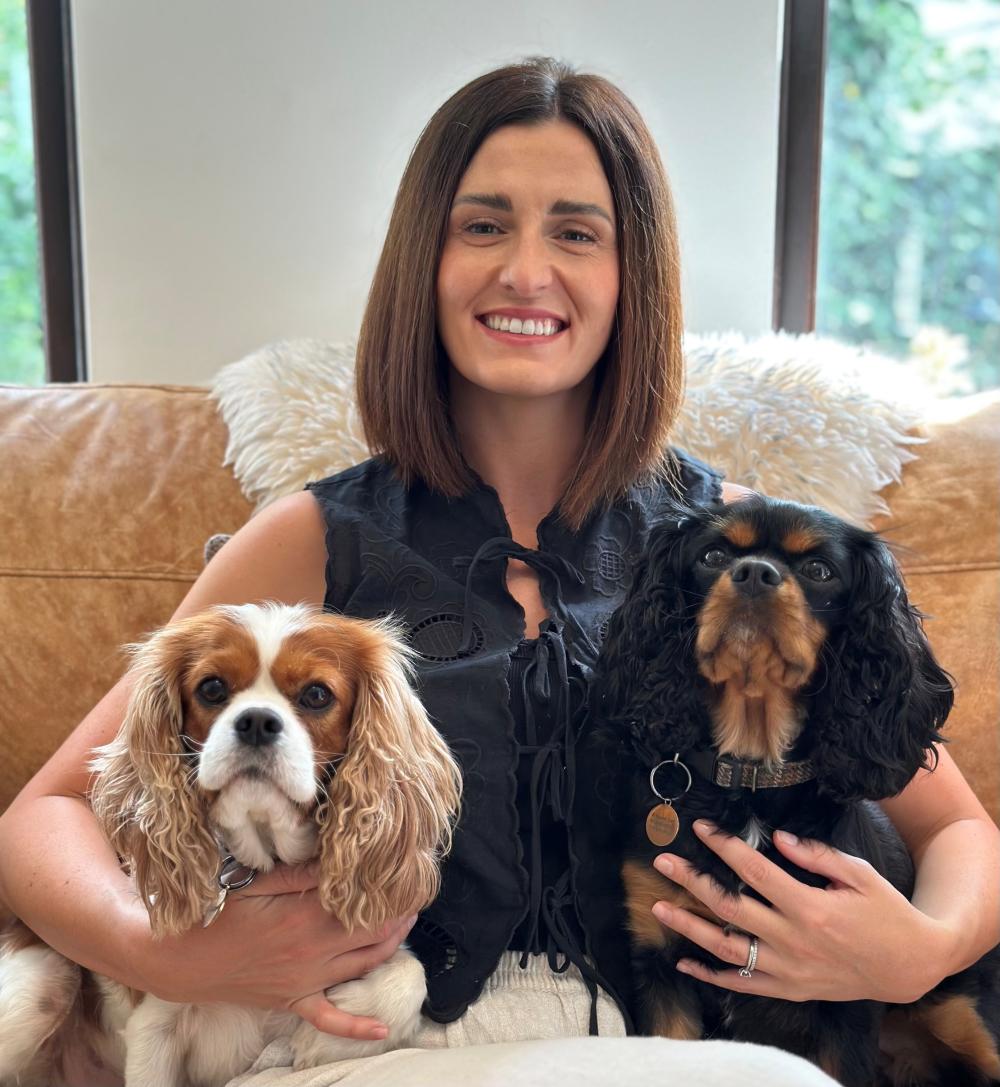Dive deeper into the world of Small Animal Cardiology with our advanced programme
The Small Animal Cardiology advanced programme enables you to learn more about the latest in veterinary cardiology and progress your development towards becoming an advanced practitioner.
Build on your confidence and skills whilst learning about the latest updates in veterinary cardiology. Increase your knowledge of more complex cardiac diseases and advanced diagnostic treatment modalities whilst exploring in-depth examinations of the evidence behind treatment recommendations.
This training will also enable you to achieve a General Practitioner Advanced Certificate in Cardiology (GPAdvCert Cardio) awarded by the International School of Veterinary Postgraduate Studies (ISVPS) and provide an open route for a Postgraduate Diploma in Advanced Veterinary Practice Sciences through our partnership with Harper Adams University (HAU). Advance your knowledge and skills throughout each of the modules and progress to the next stage of your career!
What does the programme include?
Every module is taught by experienced veterinary specialists, including practical sessions in electrocardiography and individual tutoring in echocardiography to help develop your hands-on skills.
Topics include:
- Complex cardiac diseases
- Advanced diagnostic techniques
- Cardiac emergencies
- Treatment modalities
- Cardiac interventions
The Course Director is Lara Barron (DVM MS DACVIM-CA (Cardiology) MRCVS).
Who is this programme suitable for?
This 14-module programme has been designed to build upon the knowledge and skills gained from the General Practitioner Certificate (GPCert/PGCert) in Small Animal Cardiology. It is also suitable for veterinary surgeons who already have a good knowledge of the subject, perhaps gained by attending other postgraduate training programmes or by direct clinical experience (we recommend five years in practice).
Which advanced techniques can you learn?
Our Advanced Certificate programmes are designed for veterinary surgeons who want to deepen their knowledge of a particular subject. Examples of additional and new areas covered in this advanced course include:
- Anaesthetising the cardiac patient: this naturally carries additional risks, and a veterinary specialist in anaesthesia will cover patient assessment together with protocols for sedation, anaesthesia, and monitoring
- Pulmonary hypertension: the various causes of pulmonary hypertension will be presented, and a detailed discussion will be provided on how to identify and treat them appropriately. Given the recent increase in imported cases of heartworm infestation into the UK, this will also be included.
- Latest developments in cardiac surgery: this module will include the application of minimally invasive interventions, catheter-based treatments, and some of the latest surgical approaches to treatment.
Hear what our delegates have to say
Don’t just take our word for it - our delegate feedback speaks for itself.
Key features of this programme
14 modules to guide you through advanced cardiology content over the course of one year
Two practical sessions to develop practical skills under the supervision of an experienced echocardiographer
Numerous case examples will be used to help you relate your theoretical knowledge to clinical practice
More advanced diagnostic techniques will be reviewed together with more complex cardiac diseases and their treatment options. An evidence-based approach will be used throughout the programme
Diverse learning process with presentations, notes, practical sessions and exercises that will allow you to assess your progress throughout the course
Group sizes will be strictly limited to enable an excellent learning experience
The latest ultrasound equipment
Our ultrasound training uses state-of-the-art Mindray machines supplied by Probo Veterinary, giving you hands-on experience with the latest high-quality equipment
14 modules to guide you through advanced cardiology content over the course of one year
Two practical sessions to develop practical skills under the supervision of an experienced echocardiographer
Numerous case examples will be used to help you relate your theoretical knowledge to clinical practice
More advanced diagnostic techniques will be reviewed together with more complex cardiac diseases and their treatment options. An evidence-based approach will be used throughout the programme
Diverse learning process with presentations, notes, practical sessions and exercises that will allow you to assess your progress throughout the course
Group sizes will be strictly limited to enable an excellent learning experience
The latest ultrasound equipment
Our ultrasound training uses state-of-the-art Mindray machines supplied by Probo Veterinary, giving you hands-on experience with the latest high-quality equipment
Programme details
Module Summary
01 - Review of anatomy and physiology of the cardiovascular system
This module reviews important concepts of anatomy and physiology of the cardiovascular system necessary to understand the information discussed during this course. Delegates will get an exhaustive tour of the heart’s external and internal anatomy, the heart’s vasculature, the cardiac conduction system, and the autonomic innervation of the heart and its role in regulating blood pressure. Mechanisms of cardiac electrophysiology, autonomic regulation of chronotropy, inotropy, dromotropy, and contractility will also be discussed.
- Identify internal and external landmarks necessary to interpret advanced cardiac imaging
- Describe the normal arrangement of the coronary vessels
- Explain the anatomy and function of the cardiac conduction system
- Summarize the mechanics of cardiac conduction
- List the steps of the cardiac cycle
02 - Diagnosis and treatment of cardiac arrhythmias I
This module will focus on the diagnosis and treatment of cardiac arrhythmias in a practical fashion where delegates and tutor analyse, interpret and discuss arrhythmia cases together. This is one of the most challenging subjects in cardiology, even for experienced cardiology specialists, which is why it is important that the learning experience mimics real-life clinical work as much as possible. In this first theoretical session a review of all relevant cardiac tachy- and bradyarrhythmias with focus on diagnosis and treatment will be made.
- List all types of arrhythmias highlighting their characteristics and differences
- Distinguish tachy- and bradyarrhythmias base on the ECG characteristics
- Describe the applications of Ambulatory ECG (Holter) for the diagnosis and treatment of arrhythmias
- Describe the steps of an electrophysiology study and radiocatheter ablation of cardiac arrhythmias
- List all treatment options and strategies for the various cardiac arrhythmias
03 - Diagnosis and treatment of cardiac arrhythmias II
This module will focus on the diagnosis and treatment of cardiac arrhythmias in a practical fashion where delegates and tutor analyse, interpret and discuss arrhythmia cases together. This is one of the most challenging subjects in cardiology, even for experienced cardiology specialists, which is why it is important that the learning experience mimics real-life clinical work as much as possible. In this practical session, a series of cases will be available for analysis by the delegates either individually or in small groups, followed by a detailed analysis and discussion with the tutor.
- Perform a step-by-step analysis and interpretation of each cardiac arrhythmia
- Diagnose various narrow- and wide-QRS complex tachycardias
Contains a practical session for ECG interpretation
04 - Update on acquired cardiac disease in dogs
This module will review the latest information available on the diagnosis and treatment of acquired cardiac disease in dogs. it will be possible to focus on more practical aspects of case management and introduce more advanced information and discussion on the subject (i.e. management of refractory congestive heart failure, review and critical appraisal of the literature on the use of cardiac biomarkers). Given the increase in imported cases of heartworm disease in the UK, an introduction to this disease is also included.
- List the diagnostic criteria and treatment recommendations for the different stages of heart failure
- Cite and critically appraise the existing publications on treatment of chronic valve degenerative disease and dilated cardiomyopathy in dogs
- Describe the diagnostic approach, treatment and prognosis of arrhythmogenic right ventricular cardiomyopathy in dogs
- Distinguish inflammatory myocardial disease from other myocardial disorders
- List available options for treatment of cardiac neoplasia in dogs and their influence on prognosis
05 - Cardiac Emergencies
The management of cardiac emergencies is often an intimidating subject. Whilst most veterinary surgeons are comfortable with managing chronic congestive heart failure, the challenge of treating unstable patients, patients with life-threatening cardiac arrhythmias, or even pericardial effusion can be overwhelming. In this module the steps to correctly identify and manage various urgent cardiac conditions will be presented and discussed in detail by an emergency and critical care specialist. This is one of the most important modules of the course.
- Describe the use of point-of-care ultrasonographic techniques for diagnosis of congestive heart failure
- List all treatment options and steps for management of heart failure in dogs and cats
- Explain the steps in the management of arterial thromboembolism in cats and point out the limitations associated with the prognosis of this condition
- Identify various strategies for the treatment of life-threatening cardiac arrhythmias
06 - Update on feline cardiac disease
The diagnosis and treatment of feline heart disease can be one of the most challenging subjects in veterinary medicine. Practical aspects of case management and challenges will be discussed in detail such as the management of poorly responsive heart failure cases, among other issues. A review and critical appraisal of the literature on the use of cardiac biomarkers in feline cardiac disease will also feature in this module.
- List the diagnostic criteria for distinction of the various feline myocardial diseases
- Describe and explain the treatment options for congestive heart failure in cats
- Cite and critically appraise the existing publications on the use of cardiac biomarkers for the diagnosis of cardiac disease in cats.
- List available options for treatment of cardiac neoplasia in cats and corresponding prognosis
07 - Advanced congenital heart disease
Congenital heart disease is a very challenging topic with so many different congenital abnormalities to learn and understand. In this module, more complex congenital defects will be presented and discussed such as cyanotic congenital heart disease. The diagnosis and treatment of more common congenital defects such as patent ductus arteriosus and pulmonic stenosis, will also be reviewed (i.e. use of Doppler for the diagnosis of congenital heart defects).
- List complex congenital heart defects and their characteristics
- Describe the pathophysiology of cyanotic congenital heart defects
- Explain in detail the diagnostic criteria and clinical management of patent ductus arteriosus
- Explain in detail the diagnostic criteria and clinical management of pulmonic and aortic stenosis
08 - Advanced echocardiography I
This module will take echocardiography knowledge and skills to the next level. The basics of an echocardiographic examination to the study of the various cardiac conditions encountered during clinical work. The use of echocardiography in a range of acquired conditions will be discussed in a practical fashion and some more advanced echocardiographic techniques will be introduced.
- List all echocardiographic parameters used in the diagnosis of the most common cardiac conditions and describe the information derived from each of these parameters
- Identify and distinguish the echocardiographic parameters used for the diagnosis and staging of chronic valvular degenerative disease.
- Identify and distinguish the echocardiographic parameters used for the diagnosis of dilated cardiomyopathy at the pre-clinical and overt stages.
- Describe the echocardiographic findings in hypertrophic cardiomyopathy in cats
- Explain the Doppler findings in the most common congenital anomalies
- Recognize and describe the pathophysiology of various shunting cardiac defects based on echocardiographic findings
09 - Advanced echocardiography II Day 1
This module will take echocardiography knowledge and skills to the next level. The basics of an echocardiographic examination to the study of the various cardiac conditions encountered during clinical work. The use of echocardiography in a range of acquired conditions will be discussed in a practical fashion and some more advanced echocardiographic techniques will be introduced.
- List all echocardiographic parameters used in the diagnosis of the most common cardiac conditions and describe the information derived from each of these parameters
- Identify and distinguish the echocardiographic parameters used for the diagnosis and staging of chronic valvular degenerative disease.
- Identify and distinguish the echocardiographic parameters used for the diagnosis of dilated cardiomyopathy at the pre-clinical and overt stages.
- Describe the echocardiographic findings in hypertrophic cardiomyopathy in cats
- Explain the Doppler findings in the most common congenital anomalies
- Recognize and describe the pathophysiology of various shunting cardiac defects based on echocardiographic findings
10 - Advanced echocardiography II Day 2
This module will allow the delegate to develop their practical skills under the supervision of an experienced echocardiographer. Tutoring sessions in groups of 3-4 delegates and 1 tutor per ultrasound machine will encourage discussion and learning from everyone’s experience whist ensuring that each delegate spends enough time practicing with the tutor and learning at their own pace.
- Echocardiographic technique, views and machine settings
- Echocardiographic measurements and interpretation
11 - Advances in cardiac surgery and minimally invasive interventions
In the past few years we have witnessed significant improvements in the surgical management of various cardiac conditions. In this module the existing surgical and catheter-based techniques used for this purpose will be reviewed, focusing on the indications, results and complications of each technique. This is invaluable information necessary to correctly advise on possible treatment options and avenues for our patients.
- Describe the options for minimally invasive occlusion of PDA and compare their advantages and limitations with surgical occlusion
- Identify criteria that serve as basis to recommend surgical patch-graft instead of balloon valvuloplasty for the treatment of pulmonic stenosis
- Describe the steps in surgical treatment of mitral valve disease
- List the risks and benefits of mitral valve repair under bypass
12 - Anaesthetising the cardiac patient
Performing sedation or anaesthesia in patients with heart disease can be scary due to risk of precipitating heart failure or other potentially life-threatening complications. This module is aimed at developing the necessary knowledge and skills to safely anaesthetise a cardiac patient with the guidance of an anaesthesia specialist experienced in the management of these cases. This is an invaluable skill for any veterinary surgeon dealing with dogs or cats with heart disease.
- Describe the potential risks of sedation and anaesthesia in dogs with chronic valve disease, myocardial disease, or various congenital heart defects
- Describe the potential risks of sedation and anaesthesia in cats with a cardiomyopathy or congenital heart disease
- List available sedatives and anaesthetic drugs highlighting their effects in the cardiovascular system
- List available sedation and anaesthesia protocols that are safe to use in the various cardiac conditions found in dogs and cats.
- Explain which monitoring tools should be available during anaesthesia of cardiac patients and how to interpret the information obtained
13 - Cardiac manifestations of systemic disease
The heart and the cardiovascular system in general are often targets of damage in a variety of systemic diseases. Chronic systemic illness and endocrine disorders often lead to changes and/or damage of the cardiac tissues that may result in cardiac arrhythmias or even lead to heart failure. Successful management of these consequences is dependent on the correct identification and treatment of the underlying problem as well appropriate use of cardiac medication. In this module, cardiac manifestations of systemic disease and its management will be discussed in detail.
- Describe the effects of thyroid hormone on cardiac function and list cardiac signs of hyper- and hypothyroidism
- List the cardiovascular effects of various electrolyte imbalances and explain its treatment
- Identify signs suggestive of possible pheochromocytoma and explain how a diagnosis can be obtained
- Describe the effects of cortisol and aldosterone imbalance on the cardiovascular system
- Describe the causes, consequences and treatment of systemic hypertension
14 - Pulmonary hypertension
Pulmonary hypertension is encountered relatively frequently in our patients and yet remains a challenging and poorly known subject to the majority of veterinary clinicians. In this module, the various causes of pulmonary hypertension will be presented with a detailed discussion on how to identify and treat them appropriately. Given the recent increase of imported cases of heartworm infestation into the UK, this will also be included.
- List the various classes of pulmonary hypertension
- Explain how left heart disease may lead to pulmonary hypertension and describe how to treat it
- Describe the diagnostic steps used in the diagnosis of pulmonary hypertension
- Describe the life cycle of lungworm and heartworm and its implications on diagnosis
- List treatment strategies of heartworm disease
Qualifications
Our Small Animal Cardiology Advanced programme offers you a comprehensive range of structured learning. The course will give you new knowledge and skills to take back to practice, and you can work towards a recognised qualification. Our advanced programmes are not only for those who have gained a previous qualification, such as an ISVPS General Practitioner Certificate, a Postgraduate Certificate by Harper Adams University, or an equivalent but are also suited for experienced professionals wanting to advance their cardiology knowledge.
We recommend you have at least five years’ experience working in practice before taking this course – talk to one of our team to find out more.
General Practitioner Advanced Certificate (GPAdvCert)
By attending the full online structured programme and following successful assessment, including an exam, you can gain the GPAdvCert awarded by the International School of Veterinary Postgraduate Studies (ISVPS).
Postgraduate Diploma (PgD)
A route to a PgD in Advanced Veterinary Practice Sciences is available (subject to availability) through our partnership with Harper Adams University (HAU).
Please see our pricing table for GPAdvCert fees in the pricing tab.
Pricing
£12,179.00
£12,778.00Payment & VAT Information
1. Many of our courses come with deferred payment and instalment options. Click “Book Now” to see what’s available for this course.
2. All prices will be displayed exclusive of local sales tax.
Payment Terms & Conditions
Registration Information
100% Satisfaction
We're completely confident in the quality of our training and CPD. So much so that if you're not 100% satisfied with your certificate course, we'll give you a 100% refund. Just get in touch with us within 30 days of your start date and we'll sort the rest. T's and C's apply.
Find out moreFAQs
Practical Sessions
Where are practical CPD courses or face-to-face modules held?
What will the timings be for face-to-face certificate modules and practical CPD sessions? How will my day be structured?
Where do the cadavers come from for the practical CPD and surgical modules/courses?
What should I wear to a practical CPD course/module?
I will be travelling from overseas, do I need a Visa?
Will the dogs used for practical CPD courses be sedated?
Will the dogs used for scanning have any abnormalities?
Are the dogs used for ultrasound CPD clipped?
Are cats used for any of the ultrasound courses?
Payments & Finance
What payment methods do you accept?
Do you offer any flexible payment plans?
What payment methods can I use for setting up a direct debit?
Do you issue separate invoices for each instalment?
Why was my Direct Debit payment not charged on the day that is established in my payment plan?
Why couldn’t I make payment during check-out?
Where can I find the bank details for the bank/wire transfer?
What happens if my circumstances change and I need to cancel my order?
When is payment for my veterinary CPD course due?
How much do the veterinary CPD courses and certificate programmes cost?
My course includes assessments with HAU, how do I make payment for these?
My CPD course includes assessments with ISVPS, how do I make payment for these?
Can I pay by Direct Debit?
Advanced Veterinary Certificates
How many credits does an Advanced Certificate grant towards a postgraduate diploma or professional veterinary masters?
How will I be assessed for the ISVPS GPAdvCert?
What’s not included in the Advanced Certificate programme fee? Do I need to budget for further costs?
What does the veterinary advanced postgraduate certificate programme fee include?
Who is eligible for Advanced Certificate programmes?
What is the GPAdvCert qualification? How is it different to the GPCert?
Our Clinical Excellence Centre
Discover the new Improve Veterinary Education Clinical Excellence Centre featuring two surgical wet-lab training theatres and a radiology suite.
Find out more









